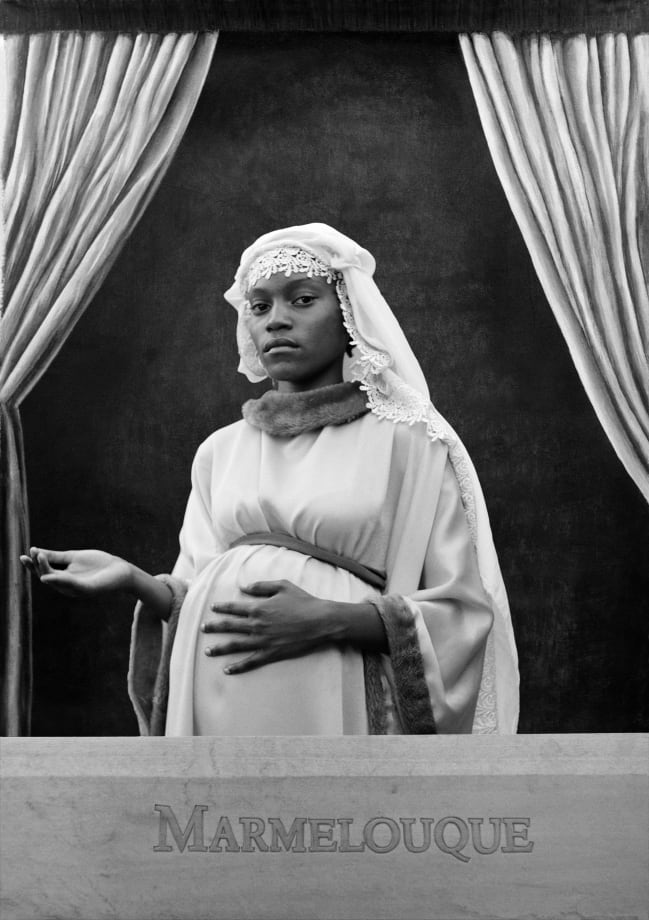Ahead of her presentation at documenta fifteen, Ed Cross is delighted to announce representation of artist Leah Gordon.
An artist, curator and writer, Gordon was born in Ellesmere Port between Liverpool and Manchester. Flanked by those historic capitals, England’s slave trade on one side and its industrial revolution on the other, Gordon had always been interested in the rationale of power. When her parents gave her a Kodak Instamatic camera won in a contest, 11-year-old Gordon found herself newly equipped to turn questions into images; while the practice she embarked on would range far beyond her hometown, the hierarchies that produced it have never drifted far from her thinking.
When a postgrad course in photojournalism took Gordon to Haiti in the early 90s, the country’s history of revolution came to crystallise many of her work’s burgeoning themes. Made over 15 years in the island’s southern commune of Jacmel, her series Kanaval features revellers in diverse costumes, melding spiritual and political satire with masquerade and ritual in an annual carnival.
Gordon’s photographs represent an exchange as well as encounter: a paradox as well as a power dynamic. At once anonymous and assertive, her subjects connect with the lens while maintaining their disguise’s remove. Kanaval honours the performance of masquerade as a spectacle, while briefly isolating each subject from their social context. Where does a mask end and a person begin? How about an individual and a community, or a past and a present? What does the camera capture, and what is beyond its scope?
Such structures represent something of a fil rouge in Gordon’s practice. Exploring the intervolved and intersectional histories of the Caribbean plantation system, the Trans-Atlantic Slave Trade and the creation of the British working-class, Gordon’s work could be said to be about joining dots of meaning. The Enclosures Act of 17th and 18th century Britain – wherein land that was once communal was sectioned off to private owners, dismantling ancient ways of living and creating an underclass almost overnight – has inspired a series in four parts: MONUMENT TO THE VANQUISHED.
With the second phase in progress, the first – The Commoners, 2021 – surveys England’s remaining common land by picturing the people still making use of it. Colour is applied by hand to the black and white images in traditional photo dying methods, invoking an uncanny sense of the historical future lost to the Enclosures. What might have been, in that parallel world? What have we lost that we can’t imagine, and how do physical limits impinge on intellectual possibilities?
Encompassing literal structures as well as metaphorical ones, Gordon’s practice is as wide ranging in scope as it is formidably precise in its line of enquiry. In joining dots, lines that were always there become visible. Whether looking at what is customarily hidden (as in Veiled Icons), forbidden (Airport Towers), forgotten (The Commoners) or misunderstood (Kanaval), Gordon tests the limits of a given arena by brushing up against them, articulating questions that find their boundaries in the very process of being posed. What are you looking at?
* * * *
At documenta, Leah Gordon presents The Caste Portraits, part of her curatorial project with Atis Rezistans (Resistance Artists). A shifting community of Haitian majority-class artists, including Gordon’s partner André Eugène, Evel Romain, Katelyne Alexis, and Claude Saintilus, Atis Rezistans are based in Port-au-Prince’s Grand Rue area where they have hosted the art festival Ghetto Biennale since its launch in 2009. Invited to particpate in documenta fifteen in Kassell, Germany, Atis Rezistans’s work is curated by Gordon and exhibited in a decommissoned church. Read more.

